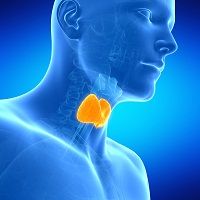Article
Hypothyroidism and the Brain: Attributing Nuisance Symptoms to a Faulty Thyroid
Author(s):
Thyroid dysfunction causes many well-recognized changes at the level of the brain, and most are reversible with treatment. Patients who have hypothyroidism often have other neuropsychiatric comorbidities, including affective disorders, depression, cognitive function loss, anxiety, or irritability.

Thyroid dysfunction causes many well-recognized changes at the level of the brain, and most are reversible with treatment. Overt hypothyroidism (an elevated serum thyroid-stimulating hormone [TSH] level with a low free thyroxine level) is renowned for its lethargy, hyporeflexia, and poor motor coordination. Subclinical hypothyroidism (an elevated TSH with a normal free thyroxine) seems to cause some subtle memory impairment. Patients who have hypothyroidism often have other neuropsychiatric comorbidities: affective disorders, depression, cognitive function loss, anxiety, or irritability.
The August issue of Current Opinion in Endocrinology, Diabetes, and Obesity included a review that summarizes hypothyroidism’s neuropsychiatric effects. It also provides guidelines for diagnosing these comorbidities and when to treat.
The author stresses that subclinical hypothyroidism has not been shown to cause major neuropsychiatric deficits, but confirms that small deficits in memory and executive function are possible. Patients diagnosed with thyroid disease often use it as an explanation or excuse for neuropsychiatric symptoms; this is a form of “labeling effect.” She notes that euthyroid patients, educated through the media and unreliable sources about hypothyroidism’s effects, may request thyroid supplementation if they experience fatigue, mood changes, or memory deficits. Patients who have thyroid disease and are adequately treated with levothyroxine should be referred for additional evaluation and therapy if neuropsychiatric symptoms continue. Increasing levothyroxine doses or prescribing other forms of thyroid hormone is not recommended.
She concludes with a summary that reminds clinicians that patients who have hypothyroidism-induced neuropsychiatric symptoms will usually improve with levothyroxine. In rare cases, the improvements may not lead to complete symptom resolutions.
In patients with subclinical hypothyroidism, clinicians need to set realistic expectations about symptom etiology and reversibility with treatment.
SOURCE: Samuels MH. Psychiatric and cognitive manifestations of hypothyroidism. Curr Opin Endocrinol Diabetes Obes. 2014 Aug 13. [Epub ahead of print]




